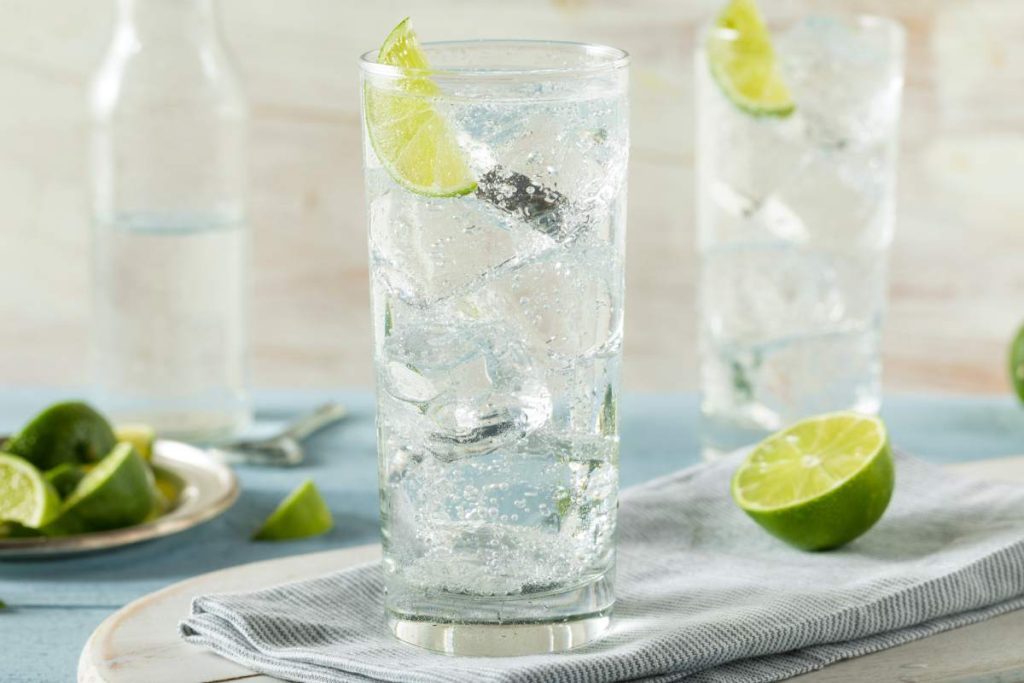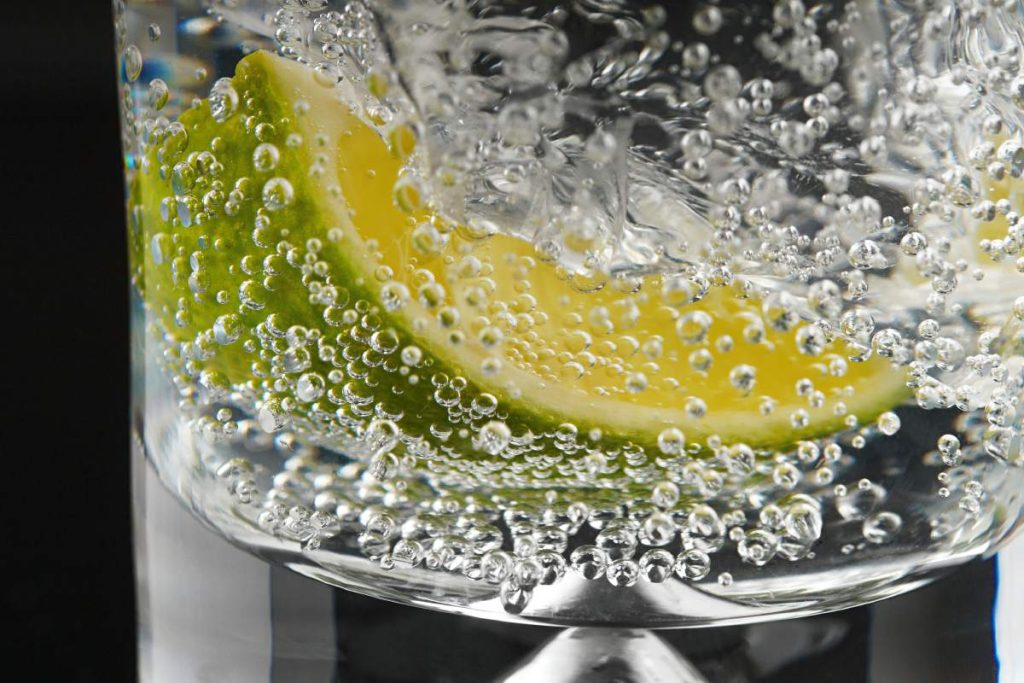Sparkling water has gained immense popularity in recent years, offering a refreshing alternative to still water and sugary sodas. Many are drawn to its fizzy texture, but is sparkling water beneficial for health, or is it simply a matter of preference?
This article will explore the health effects of sparkling water, benefits, and potential side effects of drinking it as your primary source of hydration.
You might also read:
What Is Sparkling Water?
Sparkling water is simply water infused with carbon dioxide, creating bubbles that give it a fizzy sensation. There are different types of sparkling water, including:
- Carbonated Mineral Water: Naturally sourced water with added carbon dioxide, often containing minerals like calcium, magnesium, and sodium.
- Club Soda: Carbonated water with added minerals to enhance flavour.
- Seltzer Water: Plain water with carbon dioxide added, usually without additional minerals.
- Flavored Sparkling Water: Sparkling water that includes natural or artificial flavours without calories or added sugars.
The Health Benefits of Sparkling Water

- Hydration
Like regular water, sparkling water can contribute to your daily hydration needs. For those who find plain water dull, the fizziness can make drinking water more enjoyable, potentially leading to increased water intake. - Potentially Aids Digestion
Some studies suggest that carbonated water may aid digestion by stimulating the secretion of digestive enzymes, particularly in people who suffer from indigestion or slow digestion. It has also been shown to relieve symptoms like nausea and bloating. - Supports Weight Management
Sparkling water, especially unsweetened versions, can be a healthy alternative to sugary drinks, providing a refreshing, calorie-free option that may help reduce overall calorie intake. The fizziness may also create a feeling of fullness, which can help curb appetite. - May Help Improve Swallowing
Studies have indicated that carbonated water might improve the swallowing reflex. This can be beneficial for older adults or individuals with swallowing difficulties, as the carbonation may stimulate nerves responsible for swallowing. - Low in Sugar and Calories
Unsweetened sparkling water doesn’t contain added sugars or calories, making it a preferable choice over sugary sodas. For those trying to reduce sugar intake, sparkling water offers a satisfying, healthier alternative.
Is Sparkling Water as Hydrating as Still Water?
There is a common misconception that carbonated water may not be as hydrating as regular water. However, studies indicate that both types are equally effective in hydrating the body. While some people might experience mild bloating due to carbonation, it doesn’t significantly hinder water absorption or hydration.
Potential Side Effects of Drinking Only Sparkling Water
While sparkling water is generally safe, there are some potential side effects to consider, especially if it becomes the primary source of hydration:
- Dental Health Concerns
The carbonation process makes sparkling water slightly more acidic than regular water, with a pH around 5. While it’s less acidic than sodas, prolonged exposure to acidic drinks can gradually weaken tooth enamel. However, sparkling water without added sugar is far less damaging to teeth compared to sugary sodas or citrus-flavoured waters. To minimize risks, drink sparkling water with meals and use a straw to reduce contact with teeth. - Risk of Bloating and Gas
Carbonated water releases carbon dioxide, which can lead to bloating, gas, and belching. For individuals prone to digestive issues like irritable bowel syndrome (IBS), sparkling water might exacerbate symptoms. Drinking in moderation and letting the drink sit for a few minutes before consuming may help reduce carbonation and relieve symptoms. - Possible Calcium Leaching
Some sources suggest that drinking acidic beverages, including carbonated water, could lead to calcium loss in bones. However, research has shown that only sugary sodas pose a risk to bone density due to their phosphoric acid content. Plain sparkling water does not contain phosphoric acid and is not linked to bone density loss. - Electrolyte Imbalance in High Amounts
Consuming sparkling mineral water exclusively might increase your intake of minerals like sodium, calcium, and magnesium. While these are beneficial in moderation, excessive consumption could lead to an imbalance in electrolytes, particularly sodium. It’s best to consume plain sparkling water or rotate with other beverages if you are concerned about mineral intake. - Taste Fatigue
Relying solely on sparkling water may eventually cause “taste fatigue,” where the effervescent flavor and texture become less enjoyable, leading some to crave other flavoured or sugary drinks. Drinking plain water occasionally may help prevent this and provide a good balance.

Is It Safe to Drink Only Sparkling Water?
While sparkling water can be a part of a balanced hydration routine, it’s generally recommended not to rely on it exclusively. Balancing sparkling water with plain water offers the best of both worlds, ensuring hydration without potential downsides like dental health risks or bloating.
For individuals with specific health concerns, such as sensitive teeth, acid reflux, or digestive disorders, a balance between sparkling and still water is especially advisable. Opting for a rotation between the two can minimize the risk of adverse effects while still enjoying the occasional bubbly refreshment.
Tips for Enjoying Sparkling Water in a Healthy Way
If you enjoy sparkling water and want to make it a regular part of your hydration routine, here are a few tips to help you maximize its benefits:
- Choose Unsweetened and Unflavored Options: Look for sparkling waters that are free from added sugars and artificial flavours. These varieties have fewer additives, making them a healthier choice.
- Drink with Meals: Drinking sparkling water with meals reduces the acidity’s effect on your teeth and may improve the overall digestion of your food.
- Balance with Still Water: For optimal hydration, mix sparkling water with still water throughout the day. This ensures that you enjoy the benefits of both without potential side effects.
- Use a Straw: If you’re concerned about dental health, use a straw when drinking sparkling water to reduce its contact with your teeth.
- Stay Mindful of Your Body: Pay attention to how your body responds. If you notice bloating or digestive discomfort, consider limiting your intake or opting for still water.
Conclusion: Is Sparkling Water a Health Boost or Just a Trend?
Sparkling water can be a healthy addition to your diet, offering hydration and a refreshing experience without the added sugars and calories of sodas. However, drinking it exclusively may come with minor side effects, particularly related to dental health and digestion. For most people, enjoying sparkling water in moderation and balancing it with still water provides the ideal approach, offering hydration and variety without the potential drawbacks.
So, whether you’re sipping sparkling water for its health benefits or just because you enjoy the fizz, it can be a good option for hydration as long as it is part of a balanced diet. Remember to consider your body’s individual response, and don’t forget the importance of variety in keeping your hydration habits both healthy and enjoyable.


